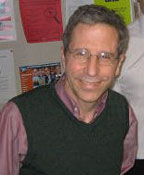Eric Maskin

(1950-)
Eric Maskin is the Albert O. Hirschman
Professor of Social Science at the Institute
for Advanced Study, and a visiting lecturer
with the rank of Professor in the Princeton
University Economics Department[1]. He attended
Harvard University where he received his
A.B. and Ph.D. After he earned his doctorate
from Harvard University, Maskin went to the
University of Cambridge in 1976 where he
was a research fellow at Jesus College. He
taught at MIT from 1977-1984 and from 1985-2000
at Harvard, where he was the Louis Berkman
Professor of Economics. In 2000, he moved
to the Institute for Advanced Study.
He has worked in diverse areas of economic
theory, such as game theory, the economics
of incentives, and contract theory. He is
particularly well known for his papers on
mechanism design/implementation theory and
dynamic games. His current research projects
include comparing different electoral rules,
examining the causes of inequality and studying
coalition formation. He is a Fellow of the
American Academy of Arts and Sciences, Econometric
Society, and the European Economic Association,
and a Corresponding Fellow of the British
Academy. He was president of the Econometric
Society in 2003.
Maskin shared the 2007 Nobel
Prize in Economics along with Leonid
Hurwicz and Roger Myerson “for having laid
the foundations of mechanism design theory.”
The following press release
from the Royal Swedish Academy of Sciences
describes Maskin’s work:
Adam Smith's classical metaphor
of the invisible hand refers to how the market,
under ideal conditions, ensures an efficient
allocation of scarce resources. But in practice
conditions are usually not ideal; for example,
competition is not completely free, consumers
are not perfectly informed and privately
desirable production and consumption may
generate social costs and benefits. Furthermore,
many transactions do not take place in open
markets but within firms, in bargaining between
individuals or interest groups and under
a host of other institutional arrangements.
How well do different such institutions,
or allocation mechanisms, perform? What is
the optimal mechanism to reach a certain
goal, such as social welfare or private profit?
Is government regulation called for, and
if so, how is it best designed?
These questions are difficult,
particularly since information about individual
preferences and available production technologies
is usually dispersed among many actors
who may use their private information to
further their own interests. Mechanism
design theory, initiated by Leonid
Hurwicz and further developed
by Eric
Maskin and Roger Myerson, has greatly enhanced our understanding of
the properties of optimal allocation
mechanisms in such situations, accounting
for individuals' incentives and private
information. The theory allows us to distinguish
situations in which markets work well
from those in which they do not. It has
helped economists identify efficient
trading mechanisms, regulation schemes
and voting procedures. Today, mechanism
design theory plays a central role in
many areas of economics and parts of
political science.
Sources: Wikipedia |